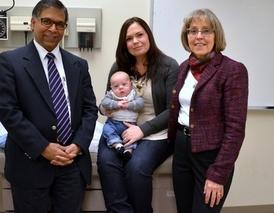Dec. 18, 2015
Do preemies benefit from more hands-on care by parents?

Janine Charles and her son Deegan with Dr. Abhay Lodha and Karen Benzies, PhD, RN.
Dwayne Brunner
Ask Janine Charles what it’s like to deliver a baby preterm. Her son Deegan arrived six weeks early, weighing only 2.4 kilograms.
“For some parents it’s quite traumatic,” says Charles, whose son was admitted into a neonatal intensive care unit (NICU) where he was cared for by nurses and doctors, around the clock. “Our biggest concern was going home, even my husband was afraid to hold him.”
Two university researchers, Dr. Abhay Lodha and Karen Benzies, PhD, RN, are launching a province-wide study to investigate how to improve the health of preterm babies and reduce family stress. The research project, funded jointly by Alberta Innovates - Health Solutions (AIHS) and Alberta Health Services (AHS), will investigate the benefits of family-integrated care in NICU IIs.
Lodha is a neonatologist in the Cumming School of Medicine (CSM), Department of Paediatrics and Community Health Sciences. Benzies is an adjunct research professor in the Department of Paediatrics (CSM) and the associate dean of research (acting) in the Faculty of Nursing. Both are members of the university’s Alberta Children’s Hospital Research Institute; Benzies is also a member of the O’Brien Institute of Public Health.
Adopting family-centred care for infants
“Family-integrated care empowers the parents to improve their knowledge, skills and confidence of taking care of a premature infant,” says Lodha. “Parents are often under stress and afraid to take their babies home because they aren’t confident with the baby’s care. Our study will build that skill and confidence by involving the parents with our experienced and well-trained clinicians.”
“We know the science of early brain and biological development and that early parent-child relationship is critically important to a child’s development,” says Benzies. Currently, parents are encouraged to participate in the daily care, but there is no protocol to ensure that this integration is upheld for families nor is it a standardized practice throughout the province. “The purpose of the study is to change the culture in NICU level II nurseries by capitalizing on pockets of excellence that already exist and to standardize that excellence across the province.”

